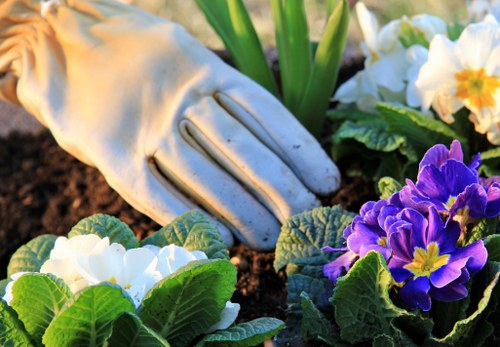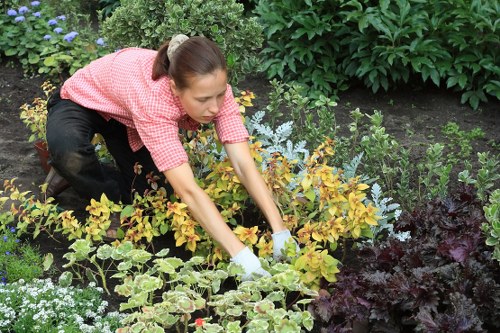Effective Driveway Algae Removal in Newbury Park

Driveway algae growth can be a persistent problem for homeowners in Newbury Park. Not only does it detract from the curb appeal of your property, but it can also pose safety hazards due to slippery surfaces. Understanding the causes and effective removal techniques is essential for maintaining a clean and safe driveway.
Algae thrives in moist and shaded environments, making driveways a prime location for its growth, especially in areas with high humidity and frequent rainfall. Newbury Park’s climate can contribute to the rapid spread of algae, making regular maintenance crucial.
Preventing algae growth involves both proactive and reactive measures. By addressing the underlying conditions that favor algae development, homeowners can minimize the recurrence and maintain a pristine driveway.
Understanding Algae Growth on Driveways

Algae, a simple plant-like organism, requires moisture, shade, and nutrients to thrive. Driveways often provide an ideal environment, especially if they receive limited sunlight and are exposed to water runoff from rainfall or irrigation systems.
The presence of organic matter, such as leaves and debris, can further support algae growth by providing additional nutrients. Over time, this can lead to the buildup of slippery green or black patches, making the driveway unsafe for use.
Different types of algae may require specific removal techniques. Identifying the type of algae present can help in selecting the most effective treatment method.
Common Types of Driveway Algae
The most common types of algae found on driveways include:
- Green Algae: These are the most prevalent and appear as bright green patches.
- Black Algae: More stubborn and difficult to remove, creating dark, slimy patches.
- Red Algae: Less common but can also affect driveway surfaces.
Effective Methods for Algae Removal

Removing algae from your driveway involves a combination of cleaning techniques and preventive measures. Here are some proven methods:
1. Pressure Washing: Using a pressure washer can effectively remove algae buildup. The high-pressure water jets dislodge the algae from the surface.
2. Bleach Solutions: A mixture of bleach and water can kill algae spores. It’s important to use the correct dilution to prevent damage to the driveway material.
3. Commercial Algae Cleaners: There are numerous products available specifically designed to remove algae. These often contain biocides that target algae growth.
Natural Remedies for Algae Removal
If you prefer eco-friendly solutions, consider the following natural remedies:
- Vinegar: White vinegar can be sprayed directly onto algae and left to kill the organisms naturally.
- Baking Soda: A mixture of baking soda and water can help scrub away algae without harming the environment.
- Boiling Water: Pouring boiling water over algae can be an effective, chemical-free method.
Preventive Measures to Keep Algae at Bay

Preventing algae from returning is often easier than removing it. Implement these strategies to maintain a algae-free driveway:
1. Improve Drainage: Ensure that water flows away from your driveway to reduce moisture that promotes algae growth.
2. Increase Sunlight Exposure: Trim overhanging trees and shrubs to allow more sunlight to reach the driveway, making it less hospitable for algae.
3. Regular Cleaning: Sweep and wash your driveway regularly to remove organic debris that can feed algae.
Sealing Your Driveway
Applying a sealant to your driveway can create a barrier against moisture and algae spores. Sealants also protect the surface from stains and wear, extending the lifespan of your driveway.
- Choosing the Right Sealant: Select a sealant compatible with your driveway material for optimal protection.
- Application Tips: Follow manufacturer instructions carefully to ensure effective sealing.
Local Expertise in Newbury Park

Hiring local professionals can make algae removal more efficient. Experts in Newbury Park are familiar with the specific climate and conditions that affect driveway algae growth, allowing them to provide tailored solutions.
Local services often use eco-friendly products and methods that are safe for your family and pets, ensuring a thorough and responsible cleanup.
Investing in professional algae removal not only enhances the appearance of your driveway but also adds to the overall value of your property.
Choosing the Right Service Provider
When selecting a driveway algae removal service in Newbury Park, consider the following:
- Experience: Look for companies with a proven track record in algae removal.
- Customer Reviews: Check testimonials and reviews to gauge customer satisfaction.
- Service Offerings: Ensure the provider offers comprehensive services, including cleaning and preventive measures.
Nearby Areas Serving Algae Removal Needs
Residents of surrounding areas can also benefit from reputable algae removal services. Here are some nearby communities:
- Ventura: Just west of Newbury Park, Ventura offers similar climate conditions ideal for algae growth.
- Thousand Oaks: Known for its lush landscapes, Thousand Oaks requires regular driveway maintenance to prevent algae.
- Simi Valley: With its varied weather patterns, Simi Valley homeowners often seek professional algae removal services.
- Camarillo: South of Newbury Park, Camarillo’s driveways frequently face algae challenges.
- Agoura Hills: Agoura Hills residents benefit from specialized services tailored to their specific environmental needs.
- Westlake Village: This affluent area maintains driveways with high-quality algae removal solutions.
- Calabasas: Known for its upscale properties, Calabasas emphasizes aesthetic driveway maintenance.
- Agua Dulce: Smaller communities like Agua Dulce also require effective algae control measures.
- Oak Park: Proximity to Newbury Park makes Oak Park a key area for algae removal services.
- Newbury Park West: As part of Newbury Park, this area shares similar algae removal needs.
Conclusion
Maintaining a clean driveway in Newbury Park involves understanding the causes of algae growth and implementing effective removal and prevention strategies. Whether opting for DIY methods or hiring local professionals, taking proactive steps ensures a safe and visually appealing driveway year-round.
Frequently Asked Questions

1. What is the best time of year to remove algae from my driveway?
The best time to remove algae is during dry and sunny periods when the weather is favorable for cleaning and preventing immediate regrowth.
2. Can algae damage my driveway permanently?
While algae itself does not cause permanent damage, the persistent moisture and organic buildup can deteriorate the driveway surface over time if not addressed.
3. Are there eco-friendly solutions for algae removal?
Yes, natural remedies like vinegar, baking soda, and boiling water are effective and environmentally friendly options for removing algae.
4. How often should I clean my driveway to prevent algae?
Regular cleaning, at least twice a year, helps prevent algae buildup. More frequent maintenance may be necessary in highly humid or shaded areas.
5. Do I need to seal my driveway after removing algae?
Sealing your driveway after algae removal provides a protective barrier against moisture and future algae growth, enhancing the longevity of your driveway.


